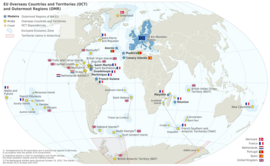Cultural approaches

Although the concept of neocolonialism was originally developed within a Marxist theoretical framework and is generally employed by the political left, the term "neocolonialism" is found in other theoretical frameworks.
Colonialityedit
"Coloniality" claims that knowledge production is strongly influenced by the context of the person producing the knowledge and that this has further disadvantaged developing countries with limited knowledge production infrastructure. It originated among critics of subaltern theories, which, although strongly de-colonial, are less concerned with the source of knowledge.
Cultural theoryedit
One variant of neocolonialism theory critiques cultural colonialism, the desire of wealthy nations to control other nations' values and perceptions through cultural means such as media, language, education and religion, ultimately for economic reasons. One impact of this is "colonial mentality", feelings of inferiority that lead post-colonial societies to latch onto physical and cultural differences between the foreigners and themselves. Foreign ways become held in higher esteem than indigenous ways. Given that colonists and colonisers were generally of different races, the colonised may over time hold that the colonisers' race was responsible for their superiority. Rejections of the colonisers culture, such as the Negritude movement, have been employed to overcome these associations. Post-colonial importation or continuation of cultural mores or elements may be regarded as a form of neocolonialism.citation needed
Postcolonialismedit
Post-colonialism theories in philosophy, political science, literature and film deal with the cultural legacy of colonial rule. Post-colonialism studies examine how once-colonised writers articulate their national identity; how knowledge about the colonised was generated and applied in service to the interests of the coloniser; and how colonialist literature justified colonialism by presenting the colonised people as inferior whose society, culture and economy must be managed for them. Post-colonial studies incorporate subaltern studies of "history from below"; post-colonial cultural evolution; the psychopathology of colonisation (by Frantz Fanon); and the cinema of film makers such as the Cuban Third Cinema, e.g. Tomás Gutiérrez Alea, and Kidlat Tahimik.citation needed
Critical theoryedit
Critiques of postcolonialism/neocolonialism are evident in literary theory. International relations theory defined "postcolonialism" as a field of study. While the lasting effects of cultural colonialism are of central interest, the intellectual antecedents in cultural critiques of neocolonialism are economic. Critical international relations theory references neocolonialism from Marxist positions as well as postpositivist positions, including postmodernist, postcolonial and feminist approaches. These differ from both realism and liberalism in their epistemological and ontological premises. The neo-liberalist approach tends to depict modern forms of colonialism as a benevolent imperialism.citation needed
Comments
Post a Comment